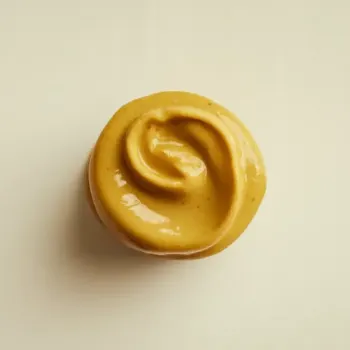Dijon Mustard and Wasabi are flavorful condiments, each adding a unique kick to dishes. Dijon is creamy, tangy, and great in dressings, marinades, and sandwiches. Wasabi offers a fiery heat ideal for sushi and Asian-inspired dishes. Use them to infuse boldness into your culinary creations.

Dijon mustard, originating from Dijon, France, is a creamy, pale yellow condiment made from brown mustard seeds and white wine or a mix of water, vinegar, and wine. It's known for its smooth texture and sharp, tangy flavor, which can add depth to various dishes.

Wasabi is a Japanese horseradish that comes from the grated root of the Wasabia japonica plant. It's typically found in a green paste or powder form and has a fiery, sinus-clearing heat that is appreciated in small amounts, especially in Japanese cuisine.
While Dijon mustard delivers a smooth, tangy heat that lingers on the palate, wasabi offers a sharp, intense burst that quickly dissipates. Dijon's texture is creamy, whereas wasabi can be either paste-like or reconstituted from powder to a paste. Dijon mustard is made with seeds and liquid, while wasabi is the ground root of a plant.

Your ultimate Recipe Box, Meal Planner, and Cooking Class all in one
Ideal in vinaigrettes, mayonnaise, and creamy sauces for its emulsifying properties and ability to add complexity. Examples include honey mustard dressing and Dijon cream sauce. Best used in soy sauce-based dips or as a complement to sushi and sashimi, providing a clean, sharp heat that enhances without overpowering delicate flavors.
An excellent addition to meat marinades, imparting a tangy flavor that penetrates deeply. Works well in marinades for pork chops or chicken. Suits fish marinades or as a crust for steak, offering a bold kick. Use sparingly to avoid overwhelming the dish. Ideal in a wasabi pea crust for tuna.
Enhances deli sandwiches, wraps, and burgers with its creamy texture and sharpness. Try it in a roast beef sandwich or a Dijon turkey wrap. Elevates sushi rolls and Asian-style wraps. A small dab can add a burst of flavor to a California roll or a wasabi shrimp wrap.
Substitutions can be tricky due to the distinct flavors. Dijon may work in place of wasabi in dressings or marinades for a milder heat, while wasabi can replace Dijon if a more intense heat is desired. However, the overall flavor profiles will significantly change.
Both Dijon mustard and wasabi are low in calories and can be enjoyed as part of a balanced diet.
| Nutrient | Wasabi ( Per Teaspoon ) | Dijon Mustard ( Per Teaspoon ) |
|---|---|---|
| Fat | 0.1g | 0.2g |
| Sodium | 0mg | 120mg |
| Protein | 0.4g | 0.3g |
| Calories | 15 | 5 |
| Carbohydrates | 2g | 0.5g |